21. The Black Dahlia (2006)
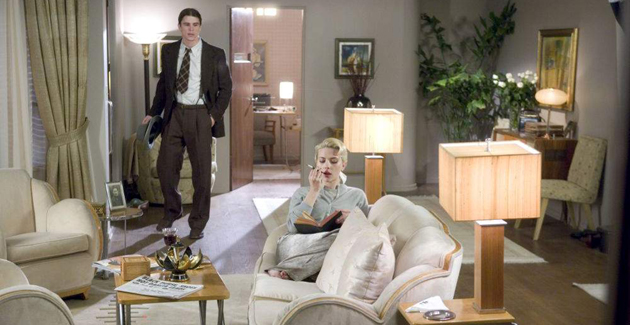
Largely a hit-and-miss neo-noir crime thriller considering it comes from genius director De Palma, there’s still a lot of style, delectable period detail, and at least one excellent performance––Mia Kirshner thrills in the doomed title role––in The Black Dahlia. Adapted from the James Ellroy 1987 crime novel of the same name, The Black Dahlia works on the widely sensationalized unsolved murder of Elizabeth Short in 1947.
The sordid true crime details remain in the film––Short was brutally dismembered and mutilated and discovered in Leimert Park, Los Angeles––but here given a glossy and overrich rendering.
LAPD Detectives Dwight “Bucky” Bleichert (Josh Hartnett, phoning it in rather poorly) and Lee Blanchard (a woefully miscast Aaron Eckhart) are investigating Short’s tragic murder, but the only part of the film that really leaves an impression, apart from the aforestated performance from Kirshner, is in the rendering of 1940s La La Land. The seamy Hollywood babylon vibe, and the recreation of the Black Dahlia crime scene and investigation minutiae are expertly handled and artfully showcased.
For forgiving audiences, and the key word here is “forgiving”, will find much in this film to muse over and the De Palma diehards will devour a few of the inspired and visually vibrant set pieces––those tracking shots and POV’s as well as a brief appearance from William Finley totally save the day.
20. Snake Eyes (1998)
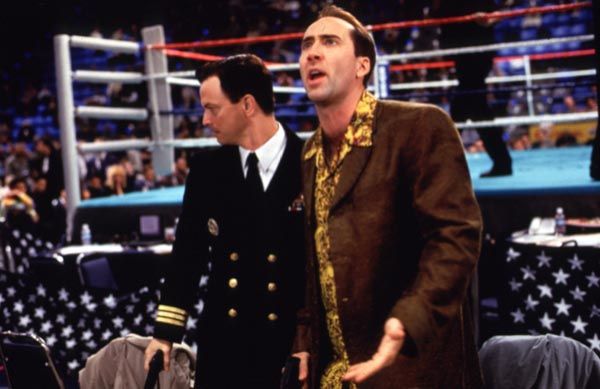
A flawed but still technically adventurous film, Snake Eyes riffs on Akira Kurosawa’s classic Rashomon conceit wherein the same event is visited and revisited from varying perspectives, with different revelations and unforeseen insights with each new wrinkle.
It’s this constant revision of a pivotal boxing match wherein a crime occurs, which we first observe in the film’s startling and superlative opening salvo––a virtuosic Steadicam tracking shot that runs congruent for a whopping 20 minutes (and contains within that time a 12 minute single take before the first masked cut).
It’s a sensational cinematic coup and is followed by something of a steep declivity since nothing else in the film attains that height again (though without being spoiler-y, a few alternate perspectives of the boxing match does add some late in the film excitement).
Nicolas Cage is way too over-the-top as Atlantic City Detective Rick Santoro who attends the high-profile boxing match in question and who, along with the obvious suspect US Navy Commander Kevin Dunne (Gary Sinise), the mysterious femme fatale-variant Julia Costello (Carla Gugino), fiery redhead Serena (Jayne Heitmeyer), and a whole mess of other potential witnesses and conspirators to a terrorist assassination are all put on lockdown in the massive sports arena as a hurricane rages outside.
If the viewer can bypass the hokey procedural aspects, the too soon reveal of the bad guy––which was regrettably revealed in the film’s trailer!––and a silly third act affray, and instead focus on the technical and stylistic wizardry at hand, Snake Eyes is solid entertainment.
19. Hi, Mom! (1970)
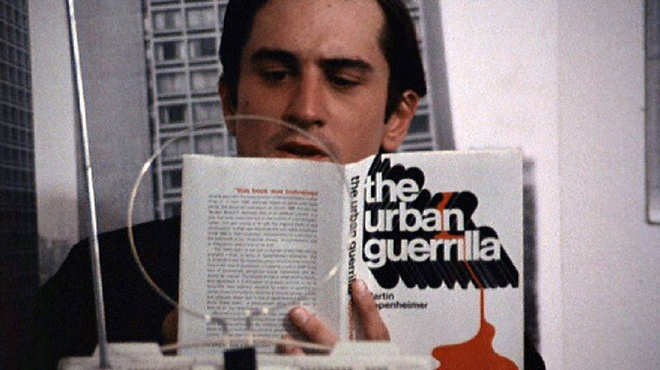
The best of De Palma’s early batch of comedies with Bobby De Niro, as well as a kinda sorta sequel to Greetings (1968), Hi, Mom! features smutty voyeuristic filmmaker Jon Rubin (De Niro), now back in New York City after serving in Vietnam. He’s not back in his old haunts long before a sleazy movie producer named Joe Banner (Allen Garfield) tries to rope him into directing a porno.
Another of De Palma’s early repertoire of actors, Jennifer Salt, stars as Jon’s vivacious neighbor Judy, whom he essentially stalks and secretly films, along with most of his neighbours, before somehow cahooting with a group of militant black activists.
De Palma fans will also recognize an early turn from Charles Durning, who would reappear in several more of the director’s films, most notably Sisters (1973).
Hi, Mom! Is part disturbing parody, part counterculture preamble and probably the first earnest attempt of De Palma to emulate Hitchcock via Rear Window, this is a funny and fractured social commentary.
18. Wise Guys (1986)
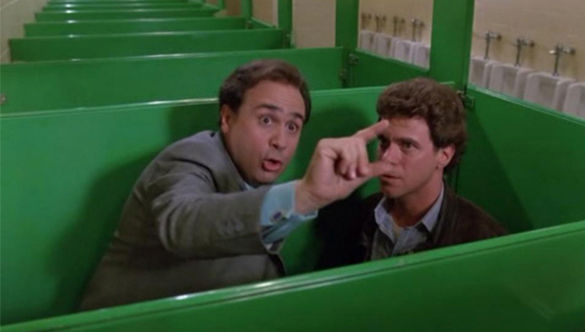
Harry Valentini (Danny DeVito) and Moe Dickstein (Joe Piscopo) are a pair of low-level crooks from Newark, New Jersey who soon find themselves mired in the criminal underworld of Atlantic City. Featuring a cast settled with pop culture fixtures (professional wrestler Captain Lou Albano is hilarious as Frank “The Fixer” Acavano) and veteran character actors including Dan Hedaya, Harvey Keitel, Ray Sharkey and Frank Vincent, Wise Guys is a surprisingly nimble comedic showcase.
“Wise Guys is an abundant movie, filled with ideas and gags and great characters. It never runs dry,” raved Roger Ebert, adding: “It never has the desperation of so many gangster comedies, which seem to be marching over the same tired ground. This movie was made with joy, and you can feel it in the sense of all the actors working at the top of their form.”
17. Redacted (2007)

A dark and decidedly cynical companion film to De Palma’s 1989 drama Casualties of War, Redacted is a controversial, contemptuous, and overwhelming anti-war film, that is obsessed and overrun with dejected voyeuristic leitmotifs and seemingly endless examples of man’s inhumanity towards his fellow man.
Forever the stylistic formalist, Redacted, set during the Iraq war in Mahmudiyah, is filmed with a gimmicky but effective combination of cameras; be they from security cameras, cell phones. laptops, and most incriminatingly, those mounted on the soldier’s helmets and uniforms, as well as what’s most damning of all, the supposed raw unedited footage from a film crew accompanying the American soldiers.
Also worthy of note, the 2007 Venice Film Festival awarded De Palma the Silver Lion for his risky and rewarding direction.
For such an intriguing premise, particularly given that Redacted is based off of a real-life incident, the 2006 “Mahmudiyah killings”––several implicated U.S. soldiers raped an Iraqi girl and then murdered her along with her family and then covered it up––this shocker adds a level of authenticity that’s impossible to capture any other way, and that De Palma populates his film with a cast of largely unknowns further underscored and asserts a palpable and unforgiving dread. Light viewing it isn’t, but essential, absolutely.
16. Obsession (1976)
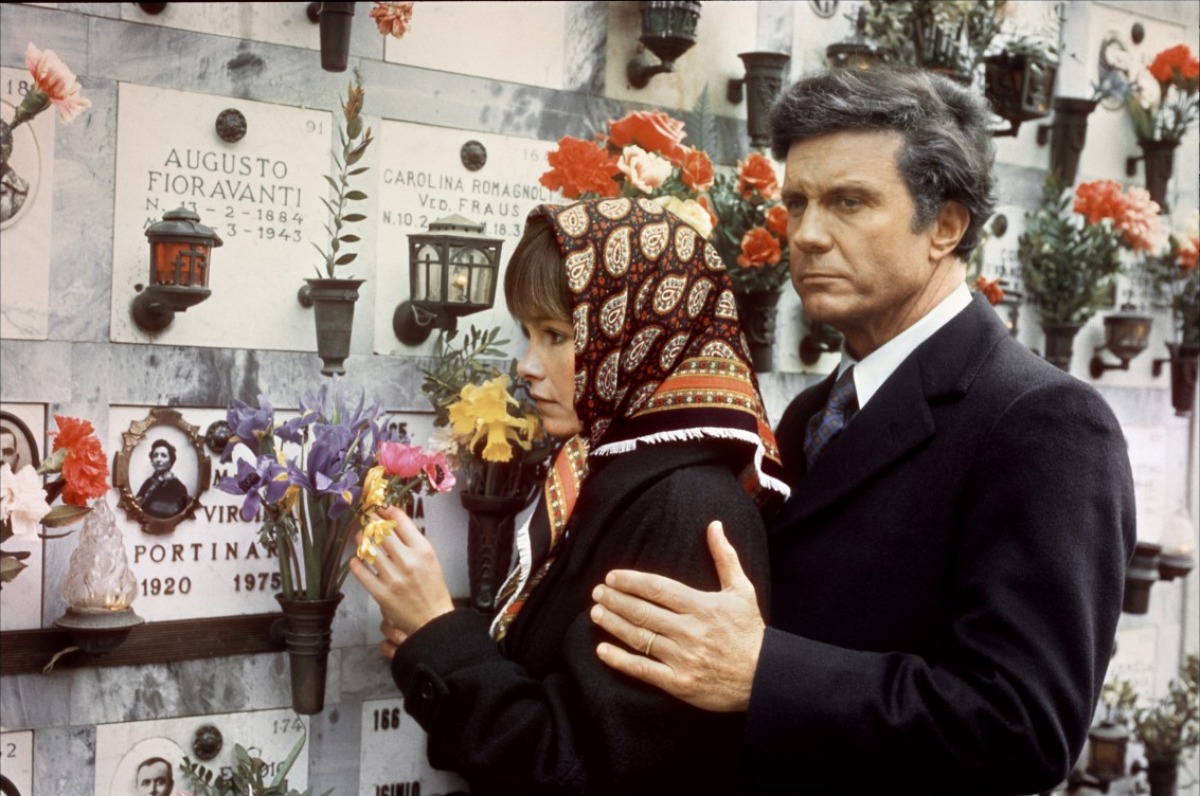
Working from a script by Paul Schrader, by a story hatched by both he and De Palma, the pair set out to pay an artful homage to their celluloid hero Alfred Hitchcock, with his 1958 classic Vertigo as the primary narrative and thematic incentive. This Hitchcockian vibe is further underscored by Bernard Herrmann’s beautiful romantic score.
Opening in 1958, father and husband Michael Courtland (Cliff Robertson) whose wife, Elizabeth (Geneviève Bujold), and daughter, Amy (Wanda Blackman), have been kidnapped by assailants unknown. After a failed rescue attempt, Elizabeth and Amy are tragically killed, leaving Michael devastated and alone.
Picking up again fifteen years later we find Michael still very much in mourning but trying to move on. Having travelled to Italy Michael meets Sandra Portinari (Bujold, again), a woman with a familiar face and a haunting grace that awakens passions and fears in him and may also unlock a mystery from the past.
Obsession also deserves some accolades for the stunning cinematography by Vilmos Zsigmond, this is a stirring throwback to highly melodramatic and romantic films of yore, bustling with suspense and fearlessly smashing a few taboos along the way.
15. Passion (2012)
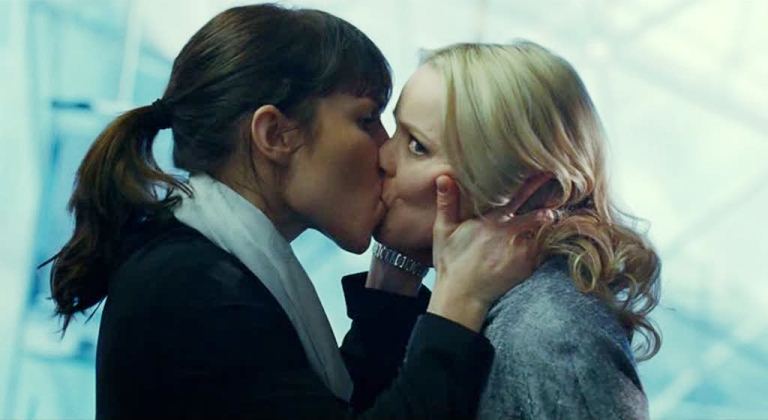
Returning to the bawdy erotic thriller stomping grounds that he playfully erected so well in the early 1980s with genre classics like Dressed to Kill (1980) and Body Double (1984), Passion is something of a throwback only here with Eurotrash designs strewn amongst the trashy rearing. Love Crime
A remake of Alain Corneau’s French psychological thriller Love Crime (2010), Passion tells the steamy story of a power struggle between two advertising executives, Christine Stanford (Rachel McAdams) and Isabelle James (Noomi Rapace) as their occasionally sexual escapades escalate after one swipes the other’s idea for a new and lucrative campaign.
Unafraid of being more than a little bit silly, and inundated with black humor amidst some sadomasochistic designs, Passion is an indulgent marvel that celebrates, as critic Peter Sobczynski points out, “[De Palma’s] rapturous visual style to elements that have driven him to artistic peaks over the years—voyeurism, media manipulation, compelling female characters, unexpected narrative twists … a film that simultaneously conveys the confident touch of a master and the energy of a newcomer eager to prove himself.”